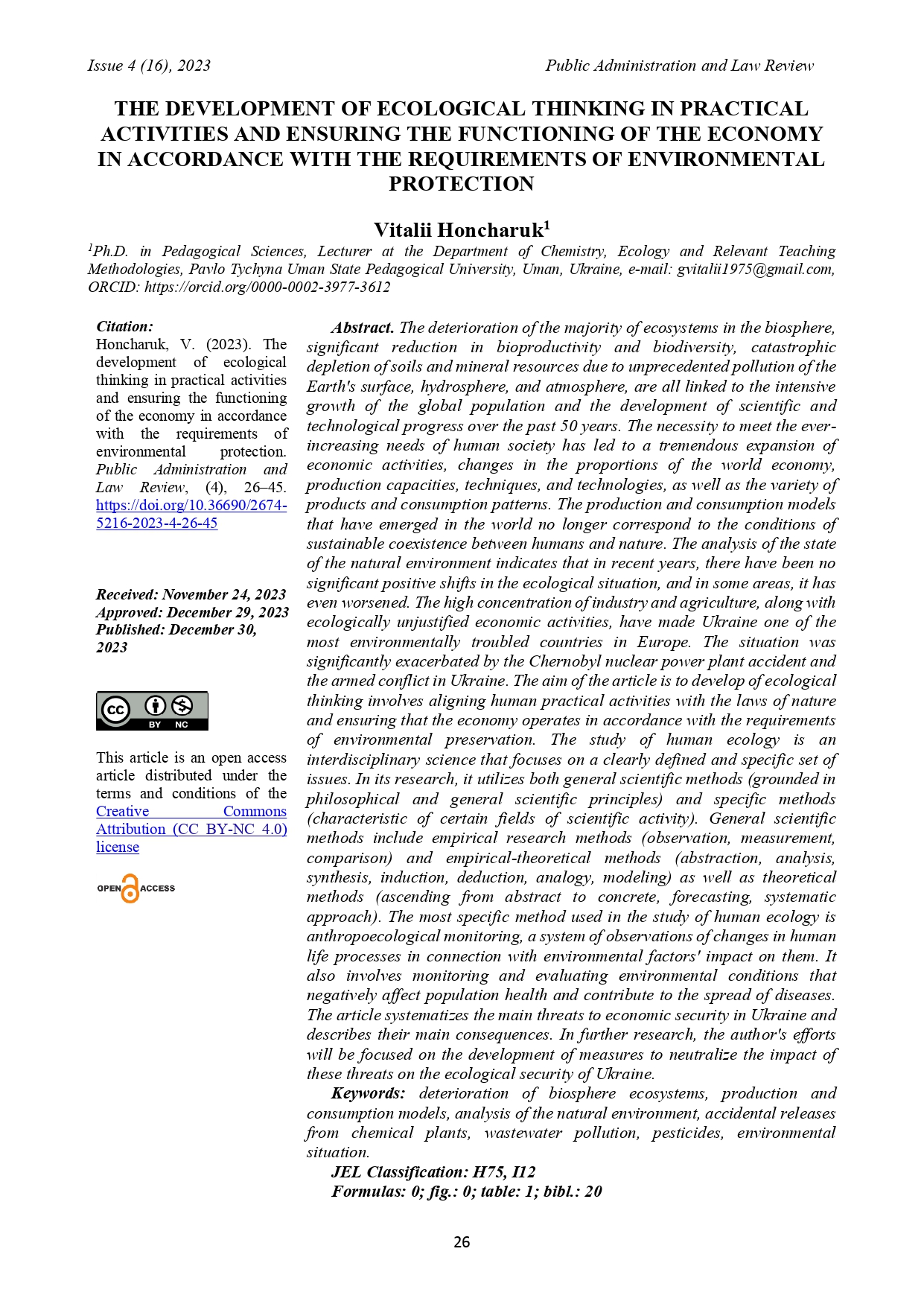THE DEVELOPMENT OF ECOLOGICAL THINKING IN PRACTICAL ACTIVITIES AND ENSURING THE FUNCTIONING OF THE ECONOMY IN ACCORDANCE WITH THE REQUIREMENTS OF ENVIRONMENTAL PROTECTION
DOI:
https://doi.org/10.36690/2674-5216-2023-4-26-45Keywords:
deterioration of biosphere ecosystems, production and consumption models, analysis of the natural environment, accidental releases from chemical plants, wastewater pollution, pesticides, environmental situationAbstract
The deterioration of the majority of ecosystems in the biosphere, significant reduction in bioproductivity and biodiversity, catastrophic depletion of soils and mineral resources due to unprecedented pollution of the Earth's surface, hydrosphere, and atmosphere, are all linked to the intensive growth of the global population and the development of scientific and technological progress over the past 50 years. The necessity to meet the ever-increasing needs of human society has led to a tremendous expansion of economic activities, changes in the proportions of the world economy, production capacities, techniques, and technologies, as well as the variety of products and consumption patterns. The production and consumption models that have emerged in the world no longer correspond to the conditions of sustainable coexistence between humans and nature. The analysis of the state of the natural environment indicates that in recent years, there have been no significant positive shifts in the ecological situation, and in some areas, it has even worsened. The high concentration of industry and agriculture, along with ecologically unjustified economic activities, have made Ukraine one of the most environmentally troubled countries in Europe. The situation was significantly exacerbated by the Chernobyl nuclear power plant accident and the armed conflict in Ukraine. The aim of the article is to develop of ecological thinking involves aligning human practical activities with the laws of nature and ensuring that the economy operates in accordance with the requirements of environmental preservation. The study of human ecology is an interdisciplinary science that focuses on a clearly defined and specific set of issues. In its research, it utilizes both general scientific methods (grounded in philosophical and general scientific principles) and specific methods (characteristic of certain fields of scientific activity). General scientific methods include empirical research methods (observation, measurement, comparison) and empirical-theoretical methods (abstraction, analysis, synthesis, induction, deduction, analogy, modeling) as well as theoretical methods (ascending from abstract to concrete, forecasting, systematic approach). The most specific method used in the study of human ecology is anthropoecological monitoring, a system of observations of changes in human life processes in connection with environmental factors' impact on them. It also involves monitoring and evaluating environmental conditions that negatively affect population health and contribute to the spread of diseases. The article systematizes the main threats to economic security in Ukraine and describes their main consequences. In further research, the author's efforts will be focused on the development of measures to neutralize the impact of these threats on the ecological security of Ukraine.
Downloads
References
Avramenko N.L. & Tsymbaliuk S.Ya. (2009). Ecology: a teaching manual. Irpin: National University of Civil Defense of Ukraine. 252 p.
Anischenko V.O. (2009). Fundamentals of Ecology: a teaching manual for higher education institutions. Kyiv: Kondor, 147 p.
Budzhak V.V., Dolzhitska A.G., Legata U.V. (2009). Fundamentals of General Ecology: a condensed lecture outline, test tasks: a teaching manual for non-biological specialties of higher education institutions: Ministry of Education and Science of Ukraine, Chernivtsi National University named after Yurii Fedkovych. [3rd edition, revised and supplemented]. Chernivtsi: Misto. 151 p.
Vasilenko L.B. (2009). Ecology: [teaching methodical manual]: in 2 parts. Kharkiv: Skorpion. Part 1. 78 p.
Vasilenko L.B. (2009). Ecology: teaching methodical manual: in 2 parts. Kharkiv: Skorpion. Part 2. 97 p.
Gainrikh D. & Gergt M. (2008). Ecology: dtv-Atlas. / scientific editor: V.V. Serebriakov; [translated from German by V.I. Lakhno]. Kyiv: Znannia-Press. 287 p.
Gandzyura V.P. (2009). Ecology: [teaching manual for students of higher education institutions] [2nd edition, revised and expanded]. – Kyiv: Stal. 375 p.
Hrytsik V., Kanarskyi Yu., Bedrii Ya. (2009). Environmental Ecology. Nature Conservation: a teaching manual. Kyiv: Kondor. 292 p.
Deyneka O.G., Omelchenko T.M., Niyakovskiy V.V. (2008). Ecology: a teaching manual. Ukrainian State Academy of Railway Transport. Kharkiv: UkrDAZT. 197 p.
Ecology: a teaching manual. (2008). edited by M.O. Klymenko. Ministry of Education and Science of Ukraine, National University of Water and Environmental Engineering. Rivne: NUVGP. 403 p.
Andronov V.A., Buts Yu. V., Kraiunyuk O.V., Kovrehin V.V (2008). Ecology: [teaching manual for students of higher education institutions] Ministry of Ukraine for Emergencies and Affairs of Population Protection from the Consequences of the Chornobyl Catastrophe, Ukrainian Civil Protection University. Kharkiv: UTSZU. 381 p.
Zaverukha N.M., Serebriakov V.V., Skyba Yu.A. (2008). Fundamentals of Ecology: a teaching manual. Kyiv: Karavela. 304 p.
Kovalchuk I.P. & Robak V.Ye. (2008) Ecology: a textbook for vocational and technical educational institutions. Kyiv. 143 p.
Kozulia T.V. (2010). Processes of Ecological Regulation. Concept of Corporate Environmental System. Ministry of Education and Science of Ukraine, National Technical University "Kharkiv Polytechnic Institute". Kharkiv: NTU "KhPI", 587 p.
Kucheriavyi V.P. (2010). General Ecology: a textbook for students of higher education institutions. Lviv: Svit. 518 p.
Fedoriak M.M. & Moskalyk H.G. (2009). Fundamentals of Ecology: a teaching manual. Ministry of Education and Science of Ukraine, Chernivtsi National University named after Yurii Fedkovych. Chernivtsi: CHNU. 335 p.
Tsyhanenko O.I., Kurilo S.M., Skliarova N.A., Tarasova N.M. (2008). Fundamentals of Ecology: [teaching-methodological manual for laboratory-practical classes: for students of higher education institutions] National University of Physical Education and Sports of Ukraine. Kyiv: Znannia Ukrainy. 51 p.
Tax Code of Ukraine [Electronic resource]. Access mode: http://zakon1.rada.gov.ua/cgi-bin/laws/main.cgi.
Selskyi V.K. (2010). Ecology and Economics of Nature Use: a teaching manual. Prykarpatskyi National University named after V. Stefanyk. Ivano-Frankivsk: Prykarpatskyi National University named after V. Stefanyk. 695 p.
Dorohuntsov S.I., Kotsenko K.F., Khvesyk M.A., and others (2006). Ecology: a textbook. [2nd edition, unchanged]. Kyiv: KNEU. 371 p.

Downloads
Published
How to Cite
Issue
Section
License

This work is licensed under a Creative Commons Attribution-NoDerivatives 4.0 International License.





